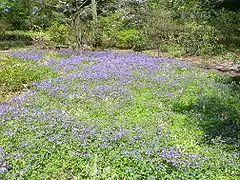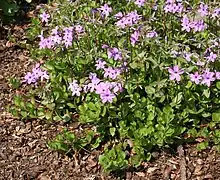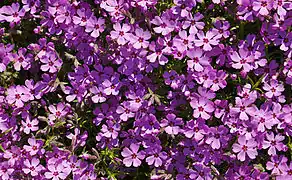| Phlox stolonifera | |
|---|---|
 | |
| Scientific classification | |
| Kingdom: | Plantae |
| Clade: | Tracheophytes |
| Clade: | Angiosperms |
| Clade: | Eudicots |
| Clade: | Asterids |
| Order: | Ericales |
| Family: | Polemoniaceae |
| Genus: | Phlox |
| Species: | P. stolonifera |
| Binomial name | |
| Phlox stolonifera Sims 1802 | |
Phlox stolonifera (creeping phlox or moss phlox) is a species of flowering plant in the family Polemoniaceae. It is a perennial herbaceous plant that is native to the eastern United States.[1] It occurs in woodlands and stream banks[1] in the vicinity of the Appalachian Mountains from Pennsylvania south to northern Georgia. Naturalized populations occur as far north as Québec, Canada.[2]
Its flowers are pale purple, pink, or white, 2–2.5 cm (0.79–0.98 in) in diameter, with a five-lobed corolla and yellow stamens, which are borne on stems that are 15–25 cm (6–10 in) tall. They lack the central band of color that is present in the flowers of the related Phlox subulata.[3]
The leaves are ovate. Those on creeping stems are 3–4.5 cm (1.2–1.8 in) long and 1.8 cm (0.71 in) broad, while those on the erect flowering stems are smaller, 2 cm (1 in) long.[3]
The Latin specific epithet stolonifera means having stolons or rooting runners.[1]
Characteristics
The creeping phlox flowers typically have 5 petals, but there could also be 6 or 7 petals. They range from pale blue and violet to purple and vibrant.
Uses
Creeping Phlox is widely used as a groundcover Its trailing growth habit and dense mat-like foliage help suppress weed growth and prevent soil erosion on slopes or in areas where grass may not thrive.
Gallery
 Large patch of phlox
Large patch of phlox Creeping stems at edge of patch
Creeping stems at edge of patch Patch of Creeping phlox
Patch of Creeping phlox
References
- 1 2 3 "Phlox stolonifera - Plant Finder". www.missouribotanicalgarden.org. Retrieved 2021-11-11.
- ↑ Biota of North America Program 2014 county distribution map
- 1 2 Sims, John. 1802. Curtis's botanical magazine, plate 563 and preceding unnumbered textual page full-page color illustration, description, and commentary.
External links
- Discover Life, University of Georgia (includes distribution map)
- North Carolina State University